Originally featured in the April 2014 issue of Thani Talk
Thai law protects freedom of religion, and the kingdom’s religious inclusiveness is evidenced by the many places of worship for a myriad of faiths in our Nonthaburi community. For example, six different worship venues are regularly listed in Thani Talk, ranging from temples to churches to synagogues to mosques.
Although the majority of Thais are Buddhist, here in our Soi Prasert Issaram neighborhood just outside of Nichada Thani, we live side by side with Muslim neighbors whose families have lived here for generations. I live on Soi Prasert Issaram and can hear the daily call to prayer that is broadcasted five times a day from speakers throughout the community. I ride my bike past the Soi Prasert Issaram mosque and buy snacks from halal food vendors. One recent afternoon, I spotted a group of young neighbors, dressed beautifully for a Muslim wedding, who were waiting for motorcycle taxis by the side of the road. Then and there, I decided it’s about time I learned more about the wonderful Muslim community in which we all live.
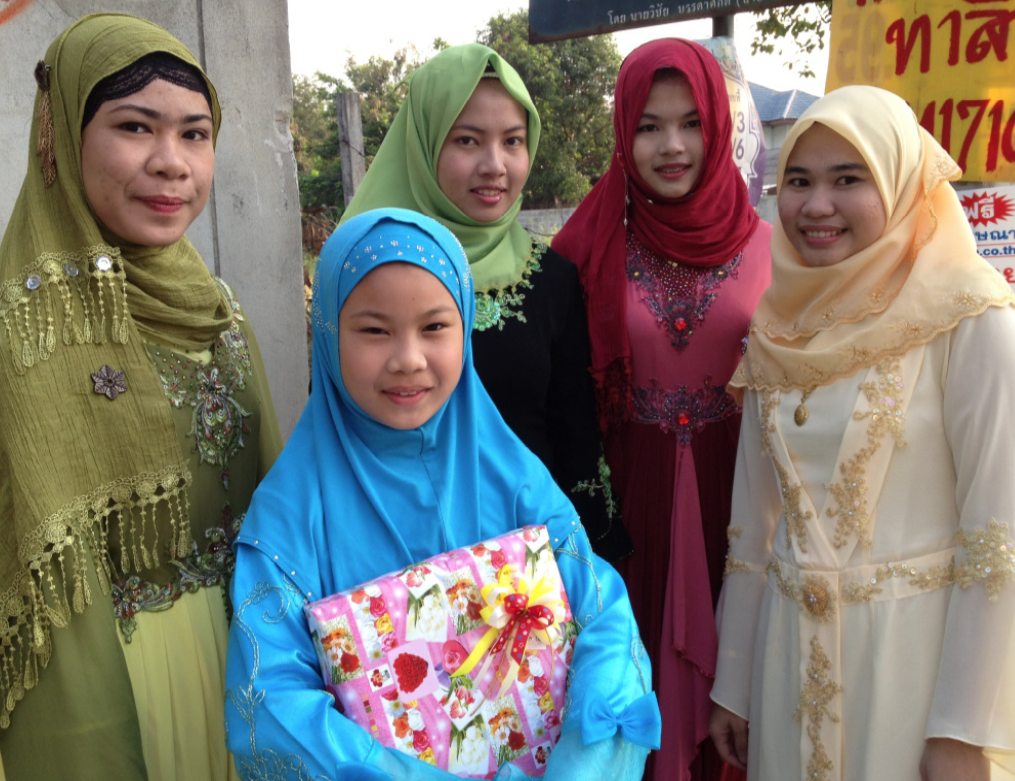
According to a 2011 survey reported by Thailand’s National Statistical Office (NSO), 94% of Thais are Buddhist, 5% are Muslim, 0.7% are Christians (mainly Catholics), and the remainder are other religious groups such as Taoists, Jews, Hindus and Sikhs. The NSO also reports that a greater percentage (30.4%) of southern Thais are Muslim, while Muslims make up less than 3% of the population in other parts of the kingdom.
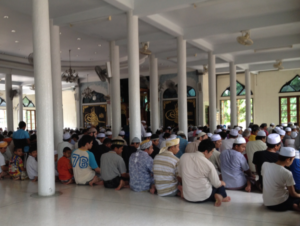
Nationwide, there are 3,494 mosques, according to NSO records, and Thailand’s Religious Affairs Department reports that 99% of the mosques are associated with the Sunni branch of Islam, and 1% are Shi’a. There are two mosques, both Sunni, here in our neighborhood. One is on Soi Prasert Issaram, and the other on Samakkee Road.
Thai Muslims migrated to the kingdom from a wide swath of Asia, including China, Pakistan, Cambodia, Bangladesh, Malaysia, and Indonesia. Some Thai Muslims, such as the well-known Boonyaratglin and Bunnag families, trace their ancestry to Persia. Although nearly two-thirds of Thai Muslims are of Malay ancestry, the majority of Thai Muslims in our Pakkred neighborhood are ethnic Thais.
The local mosques, however, welcome Muslim worshippers from all over the world who happen to live in or near Pakkred, said Yousop Leechalard, the 43-year-old imam, or spiritual leader, of the mosque on Soi Prasert Issaram. The mosque is located just 800 meters past the Subway sandwich shop on Soi Prasert Issaram. Some worshippers hail from Egypt and Jordan, he said.
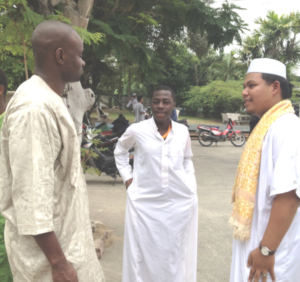 Indeed, after prayer services one recent Friday, among the crowd of worshippers leaving the local mosque were professional football players from the Ivory Coast and other African nations. Mohamed Kone, 30, plays for the Thai Premier League’s TOT team. The nearby TOT Stadium Chaengwattana is one of 20 stadiums in the league. Accompanying Mohamed at the mosque was his friend Fofana Amara, 25, who plays for the BBCU (Big Bang Chula United) team. Both men are from the Ivory Coast, and Mohamed said they also have friends from Morocco, Mali, and Gambia who attend the Soi Prasert Issaram mosque.
Indeed, after prayer services one recent Friday, among the crowd of worshippers leaving the local mosque were professional football players from the Ivory Coast and other African nations. Mohamed Kone, 30, plays for the Thai Premier League’s TOT team. The nearby TOT Stadium Chaengwattana is one of 20 stadiums in the league. Accompanying Mohamed at the mosque was his friend Fofana Amara, 25, who plays for the BBCU (Big Bang Chula United) team. Both men are from the Ivory Coast, and Mohamed said they also have friends from Morocco, Mali, and Gambia who attend the Soi Prasert Issaram mosque.
Also in the crowd of worshippers was Apin Rojvithee, 32, who works for the Suraponn Trading company located on Soi Prasert Issaram. He is a Thai citizen whose ancestors emigrated from Tamil Nadu in southern India. While the majority of Tamil Nadu residents are Hindus, approximately 6% are Muslim. Apin’s father, 61-year-old Aran Rovithee, said his own grandfather first came to Thailand to pursue a number of business opportunities, including the spice trade. Apin’s uncle Thamnoon Tulyathamrong, with his beautifully-braided white beard, also goes to the same mosque for prayers.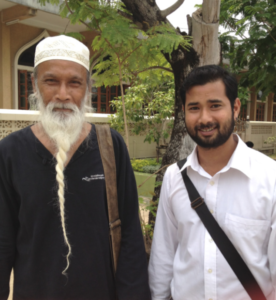
The majority of worshippers, however, are ethnic Thais whose families have lived in the Soi Prasert Issaram and Soi Samakkee areas for generations. According to Imam Yousop, approximately 500 families, representing more than 3,500 people, are in the neighborhoods served by the two local mosques.
Arriving at the mosque for my interview with the imam, I had expected to meet an elderly gentleman, so I was surprised that the leader of the Soi Prasert Issaram mosque was a tall man of 43 who looked ten years younger than his age. Imam Yousop said when his uncle, the previous imam, passed away in 2011, the “year of the great flood”, the community promptly elected him as its new leader.
“I didn’t want to be imam,” he said in Thai, “because an imam has a lot of responsibilities. But when the people elected me, I accepted.”
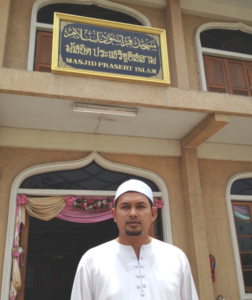 Imam Yousop’s duties include leading prayers, teaching others about Islam, and conducting community ceremonies such as weddings, funerals, and blessings, he said.
Imam Yousop’s duties include leading prayers, teaching others about Islam, and conducting community ceremonies such as weddings, funerals, and blessings, he said.
Many Muslims in the neighborhood have both Thai and Muslim names, such as Khun Nattawut Srisuk, whose Muslim name is Fadil. Khun Nattawut, a driver at Mansions in the Park, goes by the nickname “Din” and was born and raised in Pakkred. Before joining the Mansions staff, he worked for his family’s food business and taught religious studies at the Soi Prasert Issaram mosque.
As a child, Khun Din started his religious studies when he was 6, and like other children in the neighborhood, attended Islamic classes at the mosque school from 4:30pm to 6:30pm, after he had finished his regular studies at the local government Thai school. Beginning at age 16, Khun Din attended a religious school in Minburi for 7 years, coming home during school breaks to find that his childhood neighborhood had transformed overnight due to the arrival of ISB, Nichada Thani, and other modern buildings. “I was surprised,” he said. “It felt strange.” He still remembers the days when the land where Nichada now stands was empty land and rice fields. But Khun Din acknowledges that the arrival of the expatriate community has brought more jobs.
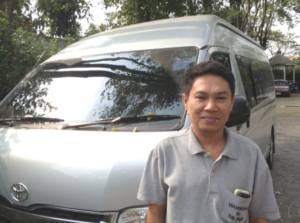
Khun Din was born and raised in the Soi Prasert Issaram neighborhood, but other locals hail from Muslim communities elsewhere in Thailand. For example, Somnuk Phudi, whose Muslim name is Bubagat, moved to Pakkred from Minburi, and Konnee Lamot, 46, moved to the neighborhood from Pathumthani at the age of 25 to marry Khun Supaida, whom he met in Pakkred during school breaks visiting relatives. Khun Konnee said he decided to make his home in Pakkred, because there were more jobs here than Pathumthani, where most of the residents were rice farmers.
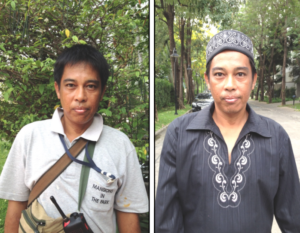
Khun Somnuk, who has one daughter, and Khun Konnee, who has two girls, said they do not insist that their daughters always wear Muslim attire when outside the home. “If she wears normal clothes she doesn’t look Muslim, but it’s no problem. It’s up to her,” said Khun Konnee. On Soi Prasert Issaram, Muslim women food vendors can be seen in a range of attire and head coverings. Some wear a shawl, others a simple knitted hat, and still others opt for no head coverings at all.
But when the young women of the community attend Friday prayers or a major event such as a wedding, 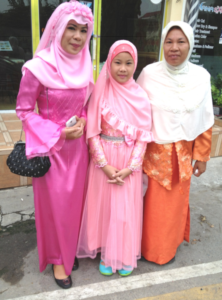 they all dress up in their prettiest traditional Muslim outfits. Soda Lamot, Khun Konnee’s 19-year-old daughter, said many locals buy Muslim outfits in Minburi.
they all dress up in their prettiest traditional Muslim outfits. Soda Lamot, Khun Konnee’s 19-year-old daughter, said many locals buy Muslim outfits in Minburi.
Then there are expatriates in Nichada Thani who are also Muslim. For example, my neighbor Lea Palma moved to Pakkred last August from Indonesia when Pepsico transferred her husband to Thailand. The couple had honeymooned in Thailand, and Lea was glad to be back.
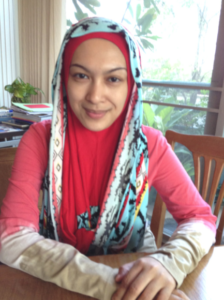 She finds the Pakkred neighborhood welcoming for Muslims, even though the kingdom is majority Buddhist. While visiting the neighborhood with her real estate agent, Lea heard the call to prayers. “I was so happy there’s a mosque!” she said. “Living far from home, I need something that reminds me of home. I saw men wearing sarongs walking by. I saw ladies wearing kerudung (veil).”
She finds the Pakkred neighborhood welcoming for Muslims, even though the kingdom is majority Buddhist. While visiting the neighborhood with her real estate agent, Lea heard the call to prayers. “I was so happy there’s a mosque!” she said. “Living far from home, I need something that reminds me of home. I saw men wearing sarongs walking by. I saw ladies wearing kerudung (veil).”
Shopping for Muslim clothing and food has also been easy, said Lea, a 33- year-old mother of triplets. She took a boat-taxi from the Nonthaburi Pier to Yaowarat (Bangkok’s Chinatown) and ended up finding shops selling kerudung, peci (hat), and even abaya (long dresses). “It never occurred to me that Chinatown would have kerudung!” she said.
Lea has visited the Middle East before, but she said Asian Muslims in Indonesia, Malaysia and Thailand share a kinship. “We have the same style,” said Lea, adding that the “Melayu” style of this region showcases happy, bright colors. “The ladies here look like my aunts in Sumatra.”
Lea, pointing to the colorful kerudung she was wearing, said that the veil makes it easier for others to know that she is Muslim, and that has come in handy. For example, helpful Thai vendors have steered her away from fish ball soup, offering friendly alerts that the broth is made from pork, which Muslims do not eat. Ever so adventurous, Lea has also discovered Ruamjai Market near Impact Arena, where she can buy halal food. She found it through word-of-mouth from other Muslim expatriate families. In Nichada Thani, there are 12 families from Indonesia, she said.
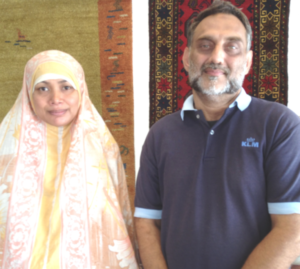 Other Muslim transplants to the neighborhood include Shawn Akbar, owner of Shawn Carpets located opposite Que Pasa restaurant on Soi Prasert Issaram. Shawn is a Muslim from Pakistan, and his wife Jaree, is a Thai Buddhist from Nakhon Si Thammarat in southern Thailand. They met at a fitness club in downtown Bangkok, and fell in love.
Other Muslim transplants to the neighborhood include Shawn Akbar, owner of Shawn Carpets located opposite Que Pasa restaurant on Soi Prasert Issaram. Shawn is a Muslim from Pakistan, and his wife Jaree, is a Thai Buddhist from Nakhon Si Thammarat in southern Thailand. They met at a fitness club in downtown Bangkok, and fell in love.
Since Islamic law requires Muslims to marry Muslims, Khun Jaree attended Muslim school in Prakanong downtown in preparation for her conversion. She said her Buddhist family is easy-going and did not mind her becoming a Muslim, as long as she is happy.
Shawn said he is glad that Khun Jaree was open to accepting his faith. He is also happy they moved out to Pakkred when the opportunity to expand his family’s “Rugs Corner” business came up.
“I’m thankful to God that He brought me here,” said Shawn, who regularly attends Friday prayers at the Soi Prasert Issaram mosque. “I’m very religious now. I guess because of the community.”
Like other faithful Muslims, Shawn and Khun Jaree hope to make a pilgrimage to Mecca one day. “Because it’s a duty of Muslims,” said Khun Jaree. “Unfortunately, we can’t right now,” she said patting her tummy. The couple is expecting their fourth child in early April.
Each year, about ten Muslims from the Soi Prasert Issaram community go on the Hajj, according to Khun Ayub Senptiyanont, a phoonaam, or mosque leader, who has for more than ten years guided groups of Thai Muslims to Saudi Arabia on 45-day Hajj pilgrimages. The tour group usually number 60 to 70 persons per year, he said, and they come from Muslim communities all over Thailand, including many from the South. About 70% of the travelers are women, said Khun Ayub. The cost, covering air fare, food and accommodations, is approximately Baht 160,000 per person, he said.
Such a price tag is beyond the means of many in the Pakkred neighborhood. Ta Kanmanee, a travel agent at the local Bilosakids Travel company, said she has handled visa applications for Muslim clients going on the Hajj, but she has yet to go herself.
The vibrant Muslim community of our neighborhood lives in harmony with all of their Buddhist friends, said the locals. “I have friends of all faiths,” said Khun Somnuk of Mansions in the Park.
Uniformly, those interviewed expressed sadness about the conflicts and resulting violence between Buddhists and Muslims in southern Thailand. Khun Jaree calls her mother in Nakhon Si Thammarat down south whenever there’s news of another attack. “She’s Buddhist there, and around her are Muslims,” said Khun Jaree, who is now a Muslim herself. “I tell her ‘Don’t go out, it’s dangerous.’”
Said her husband Shawn, “If they are killing like this, they are wrong. If you are a good Muslim, you won’t do it.”
Khun Din, the former mosque teacher, added, “In my opinion, those who commit violent acts are not practicing true Islam, because the Islam religion does not teach us to do that.”
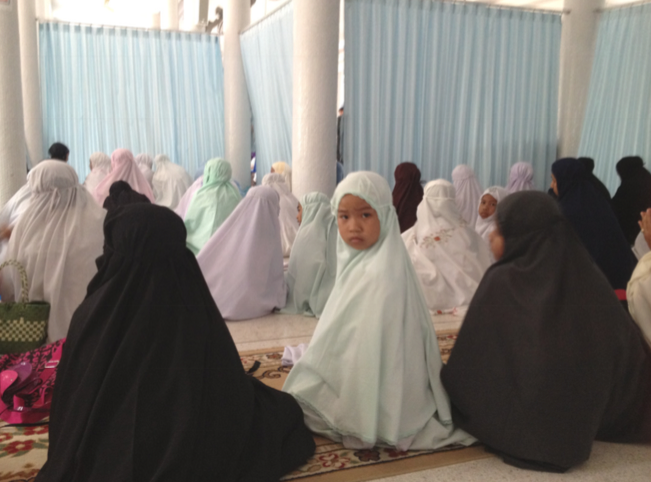
Others also emphasize that Islam does not condone violence and intolerance. The sectarian violence we hear in the news has less to do with religious differences, said many locals, and more to do with the political separatist movement. “Islam forbids us from hurting others,” said Iman Yousop. “Muslims are not dangerous.”
Iman Yousop extended an open invitation to all in the community, including foreigners of all faiths, to visit the Soi Prasert Issaram mosque and learn more about their Muslim neighbors. “They are welcome to come to the mosque,” he said, adding a request that visitors to the mosque dress in a respectful manner.
By learning more about one another, people of different faiths can live in harmony, said Iman Yousop.
Statistics from internet sources, i.e. National Statistical Office, Foreign Affairs Ministry, Religious Affairs Dept, Islamicfinder.com, Wikipedia.com, etc. Profiles from personal interviews.
Liz Lu,
 Unofficial Nichada In and Around the Bubble
Unofficial Nichada In and Around the Bubble

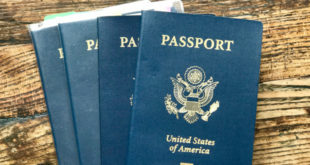


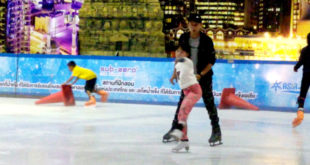
In the southern part of Thailand, i.e in Satun, Songkhla, Nakhon Si Thammarat, Pattani, Yala, Patthalung, Krabi, Narathiwat and Satun, the Muslims are mainly native Malays, i.e. they are not immigrants.